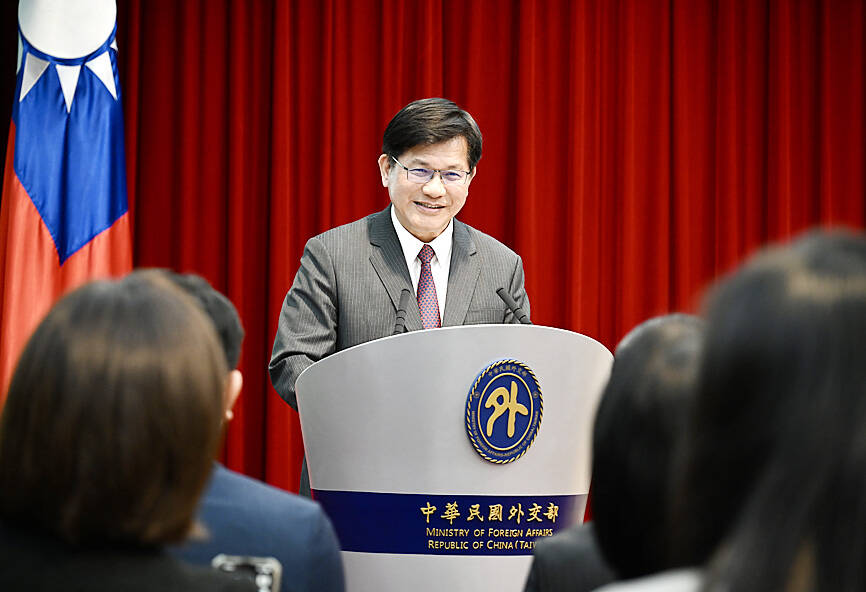US President Donald Trump’s confrontational policy toward China in his second term presents more of an opportunity for Taiwan than a threat, Minister of Foreign Affairs Lin Chia-lung (林佳龍) said.
“The main focus of Trump’s second term is countering China,” Lin said during an interview on an online talk show hosted by a local political pundit that aired on Sunday night.
Although countering China does not necessarily mean supporting Taiwan, the Trump administration’s stance gives Taiwan the opportunity to find common interests with the US, Lin said.

Photo: Lo Pei-de, Taipei Times
“Taiwan’s foreign policy is not formulated on US interests, but is rather based on Taiwan’s interests,” he said.
The government is finding common ground with Washington and focusing on promoting policies where the countries’ interests are aligned, he said.
During his presidential campaign, Trump made controversial remarks about Taiwan, including accusing the nation of “stealing” the chip industry from the US decades ago, Lin said.
Trump also repeatedly expressed frustration that Taipei does not pay the US to fund its defense, he added.
Taiwan needs to take Trump’s words “seriously, but not literally,” Lin said.
In response to Trump’s remarks, President William Lai (賴清德) last month announced that the government aimed to increase defense spending to 3 percent of GDP this year, the minister said.
Lin said he is optimistic about the Trump administration’s foreign policy, as much of the Taiwan-US cooperation during the administration of former US president Joe Biden began during Trump’s first term from 2016 to 2020, and many senior members of Trump’s national security team are Taiwan friendly.
“Trump 2.0 has so far shown more continuity in its policy than variability,” he said, adding that Trump’s second term is offering Taiwan “more opportunities than threats.”
Meanwhile, asked about the US Department of State’s decision to remove from a bilateral relations fact sheet a line indicating Washington’s long-held stance of not supporting Taiwanese independence, and whether that means stronger support from Washington, Lin said he does not believe Taiwan needs to “overinterpret” the move.
Taiwan needs to be more “practical” instead of overreacting to the wording in the fact sheet, he said.
However, it is a good sign showing the need to move away from the Taiwan-US -China trilateral relationship framework established during the Cold War and view Taiwan-US and US-China relations separately so that Beijing does not have a say in Washington’s interactions with Taipei, he said.

MAKING WAVES: China’s maritime militia could become a nontraditional threat in war, clogging up shipping lanes to prevent US or Japanese intervention, a report said About 1,900 Chinese ships flying flags of convenience and fishing vessels that participated in China’s military exercises around Taiwan last month and in January last year have been listed for monitoring, Coast Guard Administration (CGA) Deputy Director-General Hsieh Ching-chin (謝慶欽) said yesterday. Following amendments to the Commercial Port Act (商港法) and the Law of Ships (船舶法) last month, the CGA can designate possible berthing areas or deny ports of call for vessels suspected of loitering around areas where undersea cables can be accessed, Oceans Affairs Council Minister Kuan Bi-ling (管碧玲) said. The list of suspected ships, originally 300, had risen to about

DAREDEVIL: Honnold said it had always been a dream of his to climb Taipei 101, while a Netflix producer said the skyscraper was ‘a real icon of this country’ US climber Alex Honnold yesterday took on Taiwan’s tallest building, becoming the first person to scale Taipei 101 without a rope, harness or safety net. Hundreds of spectators gathered at the base of the 101-story skyscraper to watch Honnold, 40, embark on his daredevil feat, which was also broadcast live on Netflix. Dressed in a red T-shirt and yellow custom-made climbing shoes, Honnold swiftly moved up the southeast face of the glass and steel building. At one point, he stepped onto a platform midway up to wave down at fans and onlookers who were taking photos. People watching from inside

Japan’s strategic alliance with the US would collapse if Tokyo were to turn away from a conflict in Taiwan, Japanese Prime Minister Sanae Takaichi said yesterday, but distanced herself from previous comments that suggested a possible military response in such an event. Takaichi expressed her latest views on a nationally broadcast TV program late on Monday, where an opposition party leader criticized her for igniting tensions with China with the earlier remarks. Ties between Japan and China have sunk to the worst level in years after Takaichi said in November that a hypothetical Chinese attack on Taiwan could bring about a Japanese

STREAMLINED: The dedicated funding would allow the US to transfer equipment to Taiwan when needed and order upgraded replacements for stockpiles, a source said The US House of Representatives on Thursday passed a defense appropriations bill totaling US$838.7 billion, of which US$1 billion is to be allocated to reinforcing security cooperation with Taiwan and US$150 million to replace defense articles provided to the nation. These are part of the Consolidated Appropriation Act, which the US House yesterday passed with 341 votes in favor and 88 against. The act must be passed by the US Senate before Friday next week to avoid another government shutdown. The US House Committee on Appropriations on Monday unveiled the act, saying that it allocates US$1 billion for the Taiwan Security Cooperation Initiative